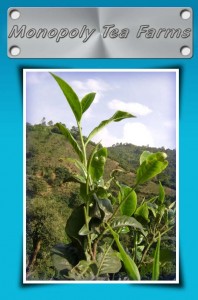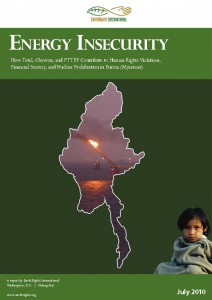Environmental and Economic Justice (103 found)
Monopoly Tea Farms
 A new briefer on the tea farming crisis in Northern Shan State where the majority of ethnic Palaung people reside. The briefer highlights the monopoly in the tea leaf business by local tea factories, and how the decline in tea price effects the farmer population.
A new briefer on the tea farming crisis in Northern Shan State where the majority of ethnic Palaung people reside. The briefer highlights the monopoly in the tea leaf business by local tea factories, and how the decline in tea price effects the farmer population.
Because of this monopoly, the main source of income of the Ta’ang people is in crisis, and the local population is facing economic, social, educational and health problems. This briefer explains how the residents cannot balance the high price of rice and other basic food with the income earned from their tea farms […]
• • •Ordered Out: The Costs of Building Burma’s Upper Paunglaung Dam
A group of European and Chinese investors is currently building a dam to power Burma’s military capital which will force 8,000 mostly indigenous people from their homes by October this year. The forced relocation will leave villagers destitute: each household must tear down their home and abandon their farm fields […]
• • •The ADB in Burma: Behind the Scenes
This paper recommends that until the people of Burma can meaningfully participate in development decisions, preconditions for responsible investment are in place, and adverse impacts can be mitigated, then the ADB should refrain from any form of new engagement with Burma. If they do engage (i.e., fund, facilitate, administer) in Burma, the ADB must follow the International Financial Corporation’s “Sustainability Framework” and adhere to their own safeguard policies, including safeguards on Involuntary Resettlement, Environment and Indigenous People, as well as the ADB’s Accountability Mechanism and Public Communications Policy […]
• • •The Burma-China Pipelines: Human Rights Violations, Applicable Law, and Revenue Secrecy
EarthRights International (ERI) today issued a damning report linking major Chinese and Korean companies to widespread land confiscation, and cases of forced labor, arbitrary arrest, detention and torture, and violations of indigenous rights connected to the Shwe natural gas project and oil transport projects in Burma (Myanmar). The publication, The Burma-China Pipelines: Human Rights Violations, Applicable Law, and Revenue Secrecy, draws primarily on two years of clandestine interviews with affected populations from Arakan State, Magway Division, and Mandalay Division, as well as leaked documents that provide new insight into secretive payments between the oil companies and the military regime, controversial security arrangements, and inadequate corporate due diligence […]
• • •Poison Clouds: Lessons from Burma’s Largest Coal Mine Project at Tigyit
The report introduces the coal mine concept at early part followed by detail facts about Tigyi Coal Project. It then explains the on-going human rights abuses and breach of national as the projected was being implemented and how the area is effected by the mining environmentally threatening careers and lives of the residents […]
• • •China to Operate Oil Wharf in Burma
China’s Qingdao Port has signed an agreement with the China National Petroleum Corporation (CNPC) to build and operate a wharf on Burma’s western coastline from which China will send its crude oil brought from Africa and the Middle East via an inland pipeline to Yunnan Province […]
• •Tyrants, Tycoons and Tigers
A bitter land struggle is unfolding in northern Burma’s remote Hugawng Valley. Farmers that have been living for generations in the valley are defying one of the country’s most powerful tycoons as his company establishes massive mono-crop plantations in what happens to be the world’s largest tiger reserve […]
• • •Energy Insecurity: How Total, Chevron, and PTTEP Contribute to Human Rights Violations, Financial Secrecy, and Nuclear Proliferation in Burma
 EarthRights International released an explosive new report that describes how the oil companies Total (France), Chevron (US), and PTTEP (Thailand) have generated over US $9 billion dollars in military-ruled Burma (Myanmar) since 1998, making their Yadana Natural Gas Project the single largest source of revenue for the country’s notoriously repressive dictatorship […]
EarthRights International released an explosive new report that describes how the oil companies Total (France), Chevron (US), and PTTEP (Thailand) have generated over US $9 billion dollars in military-ruled Burma (Myanmar) since 1998, making their Yadana Natural Gas Project the single largest source of revenue for the country’s notoriously repressive dictatorship […]
Salween Watch (Vol.2)
The latest newsletter from the Salween Watch coalition gives an update on the Thai Prime Minister’s directive to study the impacts of the Hatgyi Dam, a new agreement on the upper Kunlong dam, and China’s plans to build seven new dams in eastern Shan State on tributaries of the Salween and Mekong rivers. There is […]
• • •Total Impact 2.0: A Response to the French Oil Company Total Regarding Its Yadana Natural Gas Pipeline in Military-Ruled Burma (Myanmar)
This detailed and fact-based report refutes Total’s public response to ERI’s previous report, Total Impact. It finds that while the company may be softening to criticism and to the idea of engagement with a nongovernmental organization such as ERI, it has yet again misled the general public, investors and policymakers regarding the impacts of their […]
• • •
 All posts
All posts